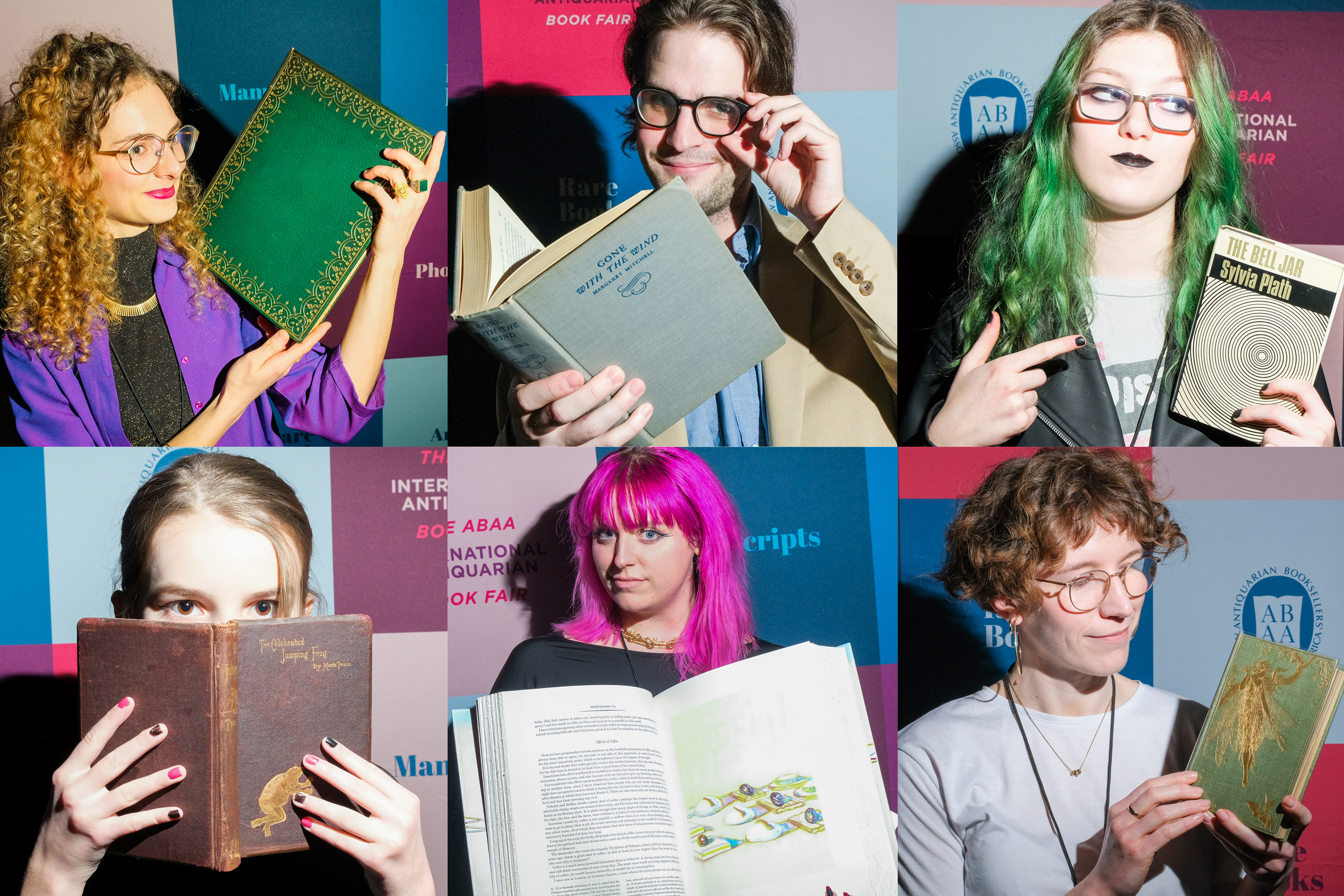The Antiquarian Booksellers’ Association of America began in 1949 with around 50 members. Most, unsurprisingly, were white men. Now in its 75th year—and the first time in a decade it has convened in San Francisco—the association looks a lot different than it did in the beginning.
“It’s moved from a gentleman’s pursuit to a pursuit for everybody,” said Susan Benne, the organization’s executive director.
The approximately 400 members represented at this year’s California International Antiquarian Book Fair last weekend include many women-owned businesses, with offerings stretching far beyond rare books.
You could pick up a 1487 guide to eradicating witches for a cool $185,000. Or perhaps you were more interested in the 1887 bartender’s guide that first codified cocktails, yours for a mere $2,200. You could also find posters protesting forced sterilization ($195), original drawings by Charles Schulz of the Peanuts Gang ($165,000) and a handmade flag made from a grape stake for Cesar Chavez’s 1993 funeral procession ($1,000).
Indiana University curator Rebecca Baumann came to the fair, held at San Francisco’s sunny Pier 27, to build a collection of queer materials for the school’s library. She zeroed in on things she’d never seen before, like the “transploitation” film poster she scored on Friday night. “We want to show our students their pasts are here and their futures can be here,” she said.
Javier Ortega, bookseller at Michael R. Thompson Rare Books in Los Angeles, said that women’s studies and education have been the most sought-after subjects lately, and the business has shifted accordingly. Ortega, who graduated from college in 2019, had on sale everything from 15th century books to a first edition of The Gift of Black Folk by W.E.B. DuBois.
Suzanna Beaupre studied history at Cambridge before she began working at the rare bookseller Peter Harrington in London. The trade sparked her own interest in collecting—specifically the works of Sylvia Townsend Warner, a prolific author from the 1920s whose books can be had for as little as 30 British pounds.
“Forgotten women are now being recognized for their literary merits,” she said. Warner lived openly with her girlfriend in Dorset in the 1920s, something that would have been scandalous at the time and could have contributed to the claims she was engaging in witchcraft.
“Trends in contemporary culture are reflected in our world,” said Sammy Jay, another bookseller at Peter Harrington. “It just takes a bit longer.”
Jay noted that there has also been a recent spike in interest in fantasy and science-fiction genres. “There’s a lot of people who have made their money in tech, and they’re kind of heady,” he said.
Jay got pulled into the rare book trade via a remarkable discovery—when he was 22, he found a first edition of Mary Shelley’s Frankenstein inscribed to Lord Byron. “It was an introduction to a world I had no idea existed,” he said.
‘Book mold—it’s calming’
Alexandra Norman attended the book fair with her father, who runs the eponymous book business Jeremy M. Norman. “The most nostalgic smell is the library,” she said. “Book mold—it’s calming.”
She traces a foundational moment in her own life to her father’s business—she opened a box of books to discover a first edition of Thomas Hobbes’ Leviathan and went on to major in philosophy at school. The self-described “booth girl” hasn’t ruled out taking over the business entirely from her father, though she’d likely specialize in illustrated literature. (She not only collects Alice in Wonderland books but is also working on her own version as an artist).
“It’s a weird world for people to dive into, especially young people,” she said. “You don’t think of it right away.”
Another bookseller’s daughter, 12-year-old Juniper Tschanz, joined her mother, Katie, from Tschanz Rare Books in Salt Lake City. When Juniper wasn’t hanging out with another bookseller’s kid, Nora Gaub from neighboring McKittrick Rare Books, she was making a little extra money by spraying people’s cases with glass cleaner.
“She made $80 last year,” said her mother.
Alex Hime, whose Biblioctopus is also a family business, has been attending book fairs since he was 2 years old. The main purpose of the fair, Hime said, is to catch the eyes of new customers with unusual objects, like the handwritten lyric sheets by Paul McCartney that generated a stir in advance of the fair.
“It’s about putting things out there that are unique, that no one else has,” he said.
Another buzzy item? An original cover art from the Ursula K. Le Guin novel The Left Hand of Darkness—an LGBTQ+ cult classic.
For the uninitiated, strolling the booths at the fair is a dizzying experience, like stepping into a museum (or a time machine) for a three-dimensional history tour. Here’s a 1660 map in which California is depicted as an island; there are the circa 1900 mother-of-pearl chips from a Paris casino.
Or look: Here’s a funerary memoir from 1832 written by a girl who died at 8. It bears a title that would be embraced by any lover of the antiquarian arts: “Do You Shrink from the Gloom and Coldness of the Grave? Learn How to Smile Upon It.”
